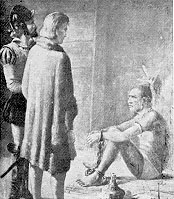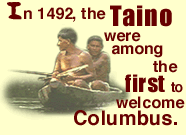Did You Know: In 1492, the official interpreter for Christopher Columbus' fleet was Luis de Torres who was a converted Jew. Torres was chosen as fleet interpreter because he spoke Hebrew and Arabic. After many attempts, Torres was unable to converse with the Taino people in Hebrew so Columbus decided to kidnap several Taino to try and teach them Spanish. One of the young Taino kidnapped was named Guaikan. He was taught to speak Spanish and became the interpreter for the expedition. Guaikan became Cristobol Colón's (Christopher Columbus) adopted Taino son. He took the name Diego Colón and sailed with Columbus on his subsequent voyages. – UCTP Taino News © 2010
Showing posts with label Christopher Columbus. Show all posts
Showing posts with label Christopher Columbus. Show all posts
Monday, November 1, 2010
Monday, February 11, 2008
Lunar Eclipse Saved Columbus

Did You Know - According to spanish historic accounts, during Christopher Columbus' fourth and final voyage in 1504, the admiral saved his starving and shipwrecked crew by using an elaborate plan designed to trick Jamaican Taino into feeding them. Columbus predicted his Christian god would make the moon "inflamed with wrath" and do evil things to them if his men were not fed. A lunar eclipse appeared, making his prediction come to pass. Columbus was able to accomplish this rouse thanks to Johannes Regiomontanus, a German scientist who published an almanac that charted solar and lunar eclipses during 1475-1506. Studying the almanac, Columbus learned that a total eclipse of the moon would happen on Feb. 29, 1504. Columbus and his crew were shipwrecked in Jamaica on June 25th 1503. Local Taino initially welcomed him and provided the castaways with food and shelter. However, after being stranded for more than six months, at least half of Columbus’ men mutinied - robbing and murdering several Taino. After this horrific turn of events, the Taino refused to assist Columbus any longer and planned to do away with the crewmen. Seeing his situation as desperate and armed with the knowledge contained in the almanac, he called a meeting with a local Taino kasike (chief) to share an ominous prediction before the scheduled eclipse. He announced to the kasike that the Christian god was “angry” because the Taino “were no longer supplying his men with food.” Columbus then stated in “three nights” he would all but obliterate the rising full moon, making it appear "inflamed with wrath," a signal that “evils” would soon be inflicted upon all the islanders. When the moon turned an eerie red as he had predicted, the reportedly “terrified” Taino brought food to Columbus' men and pleaded with him to return it to normal. Columbus announced he would privately confer with his god, and when he returned he said the moon would revert back to its natural state, and it did. The Taino continued to take care of Columbus and his men until they left Jamaica when a relief ship from Hispaniola finally arrived on June 29, 1504. – UCTP Taino News © 2008
Tuesday, January 9, 2007
Taino were Warriors
 Did You Know: Although well-renowned for their observance of a culture of peace, the Taino did not willingly succumb to Spanish colonization. In fact, not long after Columbus’s arrival, Taino in Haiti successfully revolted against the first Spanish attempts to conquer their ancient island homeland. This Taino offensive against the Spanish invaders was carried out as early as in 1492 with the destruction of the Fort Navidad following Columbus’ return to Spain. Upon his return to the fort, Columbus learned that the Taino had killed all his men in a swift military operation led by Kaonabo, a cheiftain or Kasike of Maguana, an indigenous territory near the center of the island. The rape of Taino women was among the main reasons the Taino turned to hostility. Kaonabo led a resistance against the Spaniards until he was finally captured and imprisoned. Kaonabo is said to have perished at sea while on route to face the Spanish Crown in 1496. - UCTP Taino News (c) 2007
Did You Know: Although well-renowned for their observance of a culture of peace, the Taino did not willingly succumb to Spanish colonization. In fact, not long after Columbus’s arrival, Taino in Haiti successfully revolted against the first Spanish attempts to conquer their ancient island homeland. This Taino offensive against the Spanish invaders was carried out as early as in 1492 with the destruction of the Fort Navidad following Columbus’ return to Spain. Upon his return to the fort, Columbus learned that the Taino had killed all his men in a swift military operation led by Kaonabo, a cheiftain or Kasike of Maguana, an indigenous territory near the center of the island. The rape of Taino women was among the main reasons the Taino turned to hostility. Kaonabo led a resistance against the Spaniards until he was finally captured and imprisoned. Kaonabo is said to have perished at sea while on route to face the Spanish Crown in 1496. - UCTP Taino News (c) 2007Friday, January 5, 2007
Being Called Indian...

Did You Know - The Taíno were the first Indigenous Peoples of the Western Hemisphere to be called “Indians”. According to historic sources the misnomer was applied by Christopher Columbus on his first trip to the Caribbean in 1492. This was the beginning of a legacy of “first” for this Caribbean Indigenous First Nation.The word "Taíno" means "good people" in the Taíno language (Tai = good and "no" = is a plural suffix used in this case to mean 'people').– UCTP Taino News © 2007
Subscribe to:
Posts (Atom)